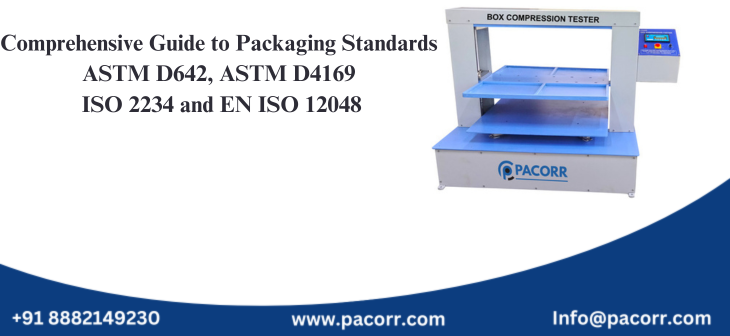
The safety and integrity of packaging are fundamental to preserving product quality at every stage of the supply chain. Packaging serves a purpose far beyond aesthetics—it ensures that products remain intact and undamaged, whether they are being shipped across vast distances or stored for prolonged periods. To achieve this, businesses must adhere to globally recognized standards like ASTM D642, ASTM D4169, ISO 2234:2015, and EN ISO 12048. These standards are vital for organizations aiming to enhance customer satisfaction, optimize costs, and maintain regulatory compliance. Let’s delve into each of these standards to better understand their significance and practical applications.
1. ASTM D642: Compression Testing for Packaging
The ASTM D642 standard outlines a method for measuring the ability of packaging systems, such as corrugated boxes or crates, to withstand compressive forces during transit and storage. The test is designed to replicate real-world scenarios where stacked packages endure vertical pressure, ensuring that packaging systems can maintain their structural integrity.
How It Works:
This test is performed using a box compression tester, a specialized machine that applies compressive force to the packaging between two parallel plates. The pressure is gradually increased until the box fails or deforms, providing crucial data on its load-bearing capacity.
Applications:
- E-commerce and Retail: Boxes used for shipping products like electronics or clothing are tested to ensure they can handle stacking pressures in warehouses and delivery vehicles.
- Warehousing: Businesses often use this test to calculate the safe stacking height for their products during storage.
Real-World Example:
Imagine a company that ships fragile electronics in corrugated cardboard boxes. By using the ASTM D642 standard and a box compression tester, they can determine the exact stacking strength of their packaging, reducing the risk of crushing during transit. Leading brands like Pacorr provide state-of-the-art box compression testers to help businesses meet these standards effectively.
Why It Matters:
Failure to meet the requirements of ASTM D642 can lead to significant product damage, increased returns, and higher costs. By adhering to this standard, businesses can ensure that their packaging solutions are robust and reliable, ultimately safeguarding their reputation.
2. ASTM D4169: Performance Testing for Distribution Systems
While ASTM D642 focuses specifically on compressive forces, ASTM D4169 is a broader standard that evaluates the performance of shipping containers and systems under various conditions they may encounter throughout the distribution cycle. These conditions include vibration, compression, impact, and even environmental factors like humidity or temperature.
Key Features:
The standard includes predefined testing procedures called "distribution cycles," which simulate real-world scenarios such as truck vibrations, drops from conveyor belts, and warehouse stacking.
Businesses can select the appropriate distribution cycle based on the type of product, mode of transport, and storage conditions.
Applications:
- Pharmaceuticals: Ensuring that sensitive medicines or vaccines arrive intact, even when transported through rough handling or extreme conditions.
- Consumer Electronics: Testing packaging for smartphones, laptops, or televisions to prevent damage during international shipping.
Real-World Example:
A pharmaceutical company shipping vaccines across multiple countries must ensure their packaging can withstand temperature fluctuations, vibrations during air transport, and handling at various stages. By following ASTM D4169, they can simulate these conditions and optimize their packaging design to maintain product integrity.
Why It Matters:
ASTM D4169 is critical for identifying weaknesses in packaging systems before they reach the market. It helps businesses avoid costly recalls and ensures that customers receive products in perfect condition.
3. ISO 2234:2015: Vertical Stability and Load Testing
The ISO 2234:2015 standard focuses on testing the vertical stacking strength of packaging systems during storage. This is especially important for industries where products are stored for extended periods in stacked configurations, such as warehouses or shipping containers.
Testing Procedure:
In this test, a static load is applied vertically to the packaging for a specified duration. This mimics real-world conditions where products are stacked one on top of the other. Factors such as deformation, structural failure, and load distribution are closely monitored.
Applications:
- Food and Beverage Industry: Ensuring that pallets of bottled drinks or canned goods remain stable during storage.
- Industrial Goods: Testing the packaging for heavy machinery parts or raw materials to prevent accidents caused by structural failures.
Real-World Example:
A beverage manufacturer shipping bottled water in palletized stacks can use ISO 2234:2015 to determine the maximum weight each layer can handle without deformation. Utilizing equipment like a box compression tester, manufacturers can optimize their packaging to meet this standard.
Why It Matters:
ISO 2234:2015 ensures that packaging systems are not only durable but also safe for workers and end-users. This reduces risks associated with collapsing stacks, which can lead to product loss or injury.
4. EN ISO 12048: Stackability and Stability
The EN ISO 12048 standard evaluates the stackability and overall stability of packaging systems under simulated storage and transportation conditions. Like ASTM D642, it focuses on compression testing but also incorporates side forces to test for tilting and shifting.
Testing Method:
Using a compression testing machine, forces are applied from the top and sides of the package to measure deformation and the likelihood of toppling. Stability is assessed under controlled environmental conditions to ensure repeatable results.
Applications:
- Retail Packaging: Ensuring that boxes used for consumer goods maintain their shape and stability on store shelves.
- Automotive Parts: Testing the packaging for heavy car parts to prevent accidents during transit.
Real-World Example:
A car parts supplier shipping heavy engine components across Europe uses EN ISO 12048 to ensure their packaging can withstand stacking pressures and vibrations during truck transport. With equipment like Pacorr’s compression testing machines, they can meet this standard and ensure safe delivery.
Why It Matters:
This standard reduces the risk of accidents caused by unstable or poorly designed packaging systems. It also helps businesses improve their packaging designs for better efficiency and safety.
Why These Standards Matter for Modern Businesses
Adopting international packaging standards is no longer optional in today’s competitive marketplace. With the rise of e-commerce, global supply chains, and increased customer expectations, businesses must ensure their packaging systems are not only efficient but also robust enough to withstand the challenges of transportation and storage.
By incorporating tools like the box compression tester, companies can easily adhere to standards like ASTM D642, ASTM D4169, ISO 2234:2015, and EN ISO 12048. These standards work together to ensure:
- Products arrive safely and intact.
- Companies reduce losses from damaged goods.
- Customer satisfaction and brand loyalty are maintained.
Packaging standards like ASTM D642, ASTM D4169, ISO 2234:2015, and EN ISO 12048 provide the framework for designing durable, efficient, and safe packaging systems. From testing compressive strength to simulating distribution hazards, these standards help businesses optimize their packaging strategies and reduce costs. By investing in advanced tools like Pacorr’s box compression testers, companies can streamline their compliance efforts, ensuring that their products meet global standards and exceed customer expectations.
Thanks to Pacorr Testing instruments, we have all the required quality testing instruments that have helped us to ensure the best quality delivered to our clients.

Danish
Fair Exports Pvt. Ltd.

